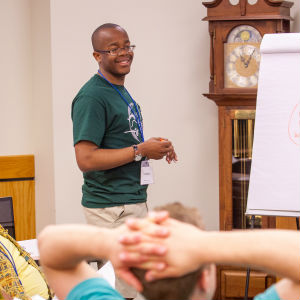
Guerrier was “selected from a highly competitive pool of over 400 applicants and representing a diverse mix of national and ethnic backgrounds,” according to a Feb. 20 news release by the sponsoring organization, Humanity in Action, an international educational organization headquartered in New York City.
EMU is one of 22 academic institutions in the United States and Europe with a selected student; it is likely the smallest among a group that includes Ankara University in Turkey, Harvard, Institut d’études politiques (Sciences Po Paris), Johns Hopkins, King’s College in London, Oxford and Princeton.
Selection criteria included “high academic standing, demonstrated experience in international diversity issues, outstanding recommendations and developed research interests,” said the Humanity in Action release.
The 24 fellows will be studying, consulting and doing research together in three cities – Washington, Berlin and Paris – with a focus on exploring “the different diplomatic approaches of each country, specifically on issues of diversity, democracy and pluralism,” said Anthony Chase, Humanity in Action’s Director of Programs.
Multiple sessions in Washington D.C. will be hosted at the Council on Foreign Relations, according to the news release. Toward the conclusion of their fellowship, the group is expected to wrap up research on a subject relating to global diversity for publication by Humanity in Action.
At EMU, Guerrier has been a graduate research assistant at the Zehr Institute For Restorative Justice, which led him to do site research on the impact of Fambul Tok International in promoting reconciliation in postwar communities in Sierra Leone.
In a blog published in September 2014, Guerrier reflected on his time in Sierra Leone, pondering its recovery from an 11-year civil war, with these words (excerpted):
“With their machetes, the child soldiers ripped open the stomach of pregnant women to see who would win the game in guessing the gender of the unborn baby.” This was a story I heard this summer, when I travelled for the first time in Africa to Sierra Leone to undertake a field research project exploring issues of justice. My question was, “How do we even begin to satisfy the justice needs of people after mass atrocities, genocide, and gross human rights violations?”
I worked with Fambul Tok International, an NGO that was formed after the war to address community reconciliation through community-led peacebuilding efforts, including truth-telling ceremonies rooted in indigenous traditions.
As we drove through the dirt and rocky roads to access remote villages, the trembles of the car shook away my sense of worry as it reawakened childhood memories from my native country Haiti. It has been 300 years since my ancestors were uprooted around the same area in West Africa and brought to Haiti on slave ships. I said to myself, “I’m happy to be back after so long”.
Through the focus group interviews I conducted, I was able to enter a sacred space within the Sierra Leonean culture… A woman told how the rebels had burned down her house, killed her husband and daughter, and stole all her cattle. She recognized the perpetrator as her neighbor, and had known him since he was a child. Even though there was a lot of pain and sorrow, she understood that since he lived in the community, neither she nor the community could move forward without reconciling with the person who had caused this harm.
I was shocked at how many people were willing to forgive. They said that healing the wounds of their society and village could not take place without it. They believed that it was an essential element to stop the cycles of violence. I was shocked because I expected to hear a more punitive, western approach to justice in which prisons are always the solution and the perpetrator is removed from the community.
As typical of Guerrier’s reflective approach to peacebuilding, he wrote that being in Sierra Leone was humbling and eye-opening. “Having observed the experiences of the people of Sierra Leone and their ability to overcome the horrors of the war through their wealth in values, I am no longer bogged down by the trivial things in my life when something goes wrong,” he said. “I live more lightly.”
Guerrier is also a board member of an EMU-affiliated organization, Coming to the Table, an organization that works across the United States to address the legacies of slavery.










